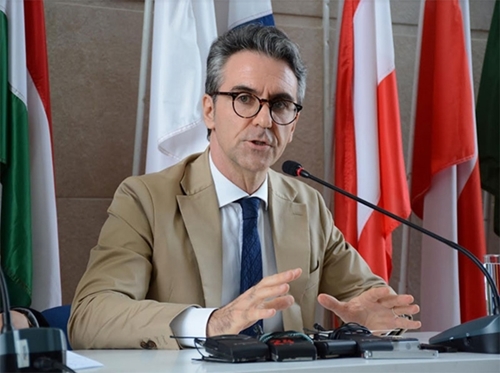Ambassador and Head of the Delegation of the European Union to Vietnam Giorgio Aliberti then held a press conference, affirming that the EVFTA and EVIPA represent a “golden chance” for Vietnam to attract more investment.
    |
 |
|
Ambassador and Head of the Delegation of the European Union to Vietnam Giorgio Aliberti at the press conference |
According to Ambassador Giorgio Aliberti, the approval of the two agreements is a historic milestone that both Vietnam and the EU have been waiting 10 years for. He stressed that the two agreements were voted with high approval rates by both the National Assembly of Vietnam and the European Parliament. The two agreements are important factors in boosting economic development and bilateral trade.
Accordingly, the EVFTA will take effect on August 1, 2020. Along the 10-year road-map of the agreement implementation, the taxes imposed on all goods from Vietnam exported to the EU will gradually decrease to 0%. The agriculture sector will benefit the most from the EVFTA due to the EU’s geographical indications (GIs), which facilitate the export of Vietnamese goods to the EU.
The World Bank has estimated that the EVFTA will contribute about 2.4% to the GDP growth of Vietnam, increase export value by 12%, and help 800,000 people out of poverty. Ambassador Giorgio Aliberti held that the effects of the EVFTA depend on how the agreement is implemented and how Vietnam carries out its reforms. If favorable, the benefits of the EVFTA are especially significant.
According to the Head of the Delegation of EU to Vietnam, the signing of the EVFTA has brought Vietnam great advantages in penetrating the EU market. Vietnamese consumers will have chances to enjoy high-standard EU products at reasonable prices. The agreement will also benefit Vietnamese producers, giving them easier access to the high-purchasing-power EU market.
Meanwhile, the EVIPA is now waiting for the approval of the parliaments of EU member states to take effect. Its contents concerning investment are also mentioned in the EVFTA, however. Apart from that, more than 20 member states of the EU have already exercised their bilateral investment protection agreements with Vietnam. This is an encouraging start, making favorable conditions for foreign businesses to invest in Vietnam.
In the future, Ambassador Giorgio Aliberti believes that the important thing is the bilateral trade boost. Investment is mostly in the area of trade. When trade activities run smoothly, EU investors will see the potential of Vietnam and seek opportunities for cooperation. They need time to learn more about Vietnam as well as the Vietnam-EU bilateral trade relations. This serves as a “U-turn,” helping Vietnam integrate better into the global value chain.
However, investment policies of Vietnam must create comprehensive attraction, not just focusing on cutting taxes. There should be a multi-dimensional approach to building the policies, helping create a favorable and attractive investment environment on the basis of transparent administrative procedures while the mechanism for dealing with disputes must be effective. Apart from that, to improve export efficiency, Vietnam should focus on manufacturing high-quality products that meet labor and hygiene standards, and other market standards.
Translated by Huu Duong